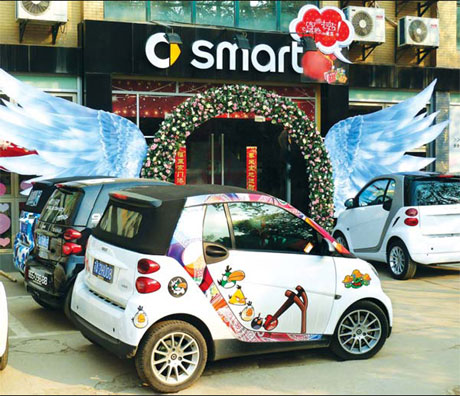Dealer services crucial as margins tighten
Updated: 2012-07-09 16:55
By Geoff Broderick (China Daily)
|
|||||||||||
|
Successful full-service dealer outlets have knowledgeable staff and financing options available. [Wang Luxian / For China Daily] |
Refined sales staff, new revenue streams needed
While China's automotive market is the largest in the world, it may also be the most difficult to manage - for both manufacturers and sellers.
While markets in the US and Europe had decades to evolve, China's auto industry had to adapt to lightening fast changes all in the blink of an eye.
In the very early days, automakers realized that building cars and selling cars are two very different pursuits.
For starters, the complexities of making a vehicle are enormous. It requires vehicle and component designers; product, process and certification engineers; hundreds of parts suppliers; expensive tooling; thousands of assembly workers; an assembly plant; and enormous capital expenditure to jumpstart the whole process - with no promise of profit in return.

Then, once the manufacture of a new vehicle is finally completed, the finished product still needs to be marketed and sold to consumers spread out over vast distances in large cities and small towns. This meant the formation of a national distribution network, establishment of retail sales outlets, creation of shipping schedules and inventory controls for vehicles and spare parts, and an efficient way to collect revenue and transfer it back to the automaker.
Auto executives learned that trying to organize both the manufacture and sale of a large number of vehicles proved to be too complex and too financially risky for any single company. A solution was needed.
That solution came with the creation of the first franchised automotive dealership in Pennsylvania in the US in 1898.
Automakers discovered that while they focused on what they did best - engineering and building vehicles - dealers could pursue what they do best, selling and servicing vehicles in their local communities.
From that first dealership in 1898 until the middle 1990s, the process of selling a car had not changed much. But with the advent of the Internet, the process changed considerably. Prior to the Internet, all the power in the seller-buyer relationship resided with the dealer because the dealer held all the information about the vehicle's pricing, options and competitors.
Since the introduction of the Internet, however, the consumer has become greatly empowered, and in many cases, is more informed than the people working inside the dealership. As a result, it's much more difficult for dealers to control the sales experience when they are dealing with a highly knowledgeable consumer.
So how does a dealer make his business work? It sounds simple: Provide the consumer what he wants while realizing a sensible profit for himself.
Yet there is no "one size fits all" consumer. Some consumers love the thrill of shopping for a vehicle and negotiating the lowest price, while others would rather go to the dentist than haggle over the purchase of a car. There simply is no universal answer.
Customer satisfaction
Based on JD Power's experience working in markets around the world, the most successful dealers will cater to the customer's preferences while trying to make the entire purchase process as pleasurable as possible.
Customer satisfaction with the sales process is crucial. But, it is not satisfaction for satisfaction's sake. A dealer wants satisfied shoppers, no doubt, but a satisfied buyer is more important.
To start off right, dealers need to determine a consumer's expectations up front and tailor the experience, within limits, to the consumer's needs. If done properly, the prospect will turn into a paying customer, and a buyer's satisfaction can lead to long-term loyalty, a critical element to the long-term success of a dealership.
Although service quality can vary widely across industries, 5-star hotels in China and major Chinese airlines, provide some of the best service in the world when compared to their global counterparts.
Their success is predicated on an intense focus on the customer experience and training of staff to deliver that experience in a consistent manner. If these industries can do it, there is no reason that it cannot be done in the automotive retailing business in China.
From a business perspective, it pays to deliver customer satisfaction. According to the JD Power 2011 China Sales Satisfaction Index Study, dealers with higher satisfaction than their peers tend to be more profitable and sell more cars. More important to the dealer, however, is long-term business from their car buyers. Repeat customers are frequently what make a business profitable and sustainable.
As reported in the JD Power and Associates 2012 China Dealer Attitude Study, 20 percent of dealers reported a loss, which was an increase from 6 percent in 2010.
The recent market slowdown, of course, is one contributor to the decline. In addition, competition in China's market is driving down prices, which compresses dealer margins.
As competition continues to intensify, dealers will need to rely on the service business, the now-nascent used-car sector and vehicle financing businesses as core contributors to their revenue and profits. For a dealer to gain, and retain this service business, the dealership's consumers must have a good sales experience, as this experience builds long-term loyalty and positive word-of-mouth referrals.
Catering to the consumer starts from the moment a consumer walks into the showroom, until follow-up after the sale.
At times, entering a dealer showroom can be an awkward moment as the consumer waits to meet a sales associate. But a pleasant and thoughtful greeting from a dealership sales associate can set the tone for the entire experience. For example, during the greeting portion of the sales process, a sales associate needs to ask targeted questions to understand the customer's requirements, so he or she can steer the process in a direction preferred by the customer.
Similar to an Apple store sales associate, it's important for an auto dealership sales associate to be a product expert. Explaining features and benefits targeted to a customer's primary interests - and then demonstrating those features and benefits during a test drive - can build customer confidence and significantly improve sales close percentage rates.
Of course, some consumers believe that their main priority is to obtain the best deal when buying a car or service. When taking a holistic view of the process, however, it frequently may be in the best interest of the consumer to allow the dealer to make a reasonable profit.
Like a trusted doctor, a profitable dealer will more-often-than-not be looking out for the long-term best interests of his most loyal customers. This should ultimately result in a better overall ownership experience for the customer in the long-term, even if it costs a little more in the short-term.
The author is the vice-president and general manager of JD Power and Associates Asia Pacific in Shanghai











